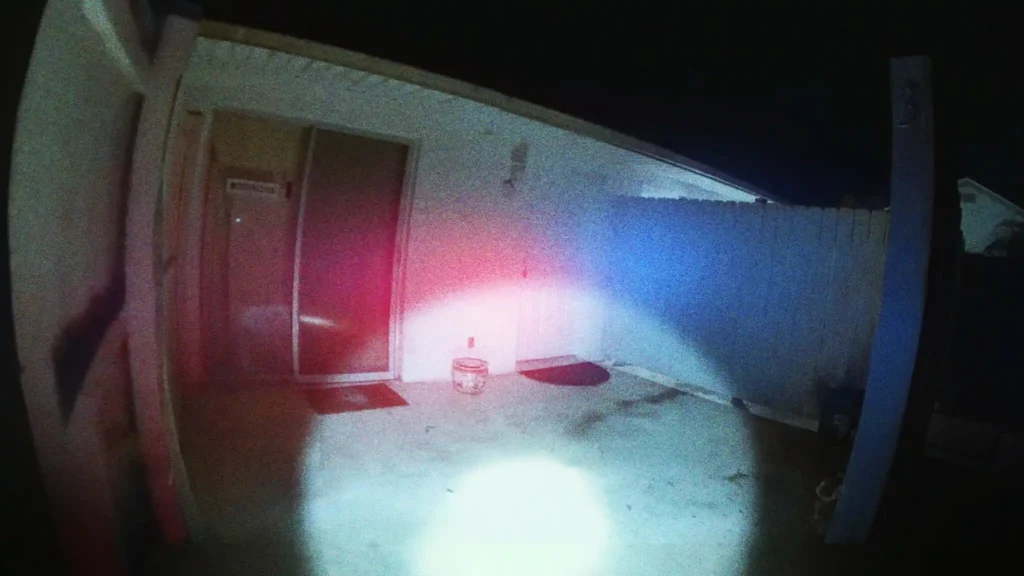
The Perfect Neighbor is an engaging and quite uniquely constructed true-crime documentary that, at about the midpoint, morphs into one of the most harrowing films I’ve ever seen. Its key formal quirk, that it’s constructed entirely from pre-existing audio and video footage, including, most pertinently, real-time bodycam recordings, becomes a window into extraordinarily raw moments of anger, loss, and panic. The effect as a documentary is profound; as a cautionary tale about controversial “Stand Your Ground” laws, racial prejudice, and America’s fondness for firearms, it may be more chilling still.
While Geeta Gandbhir’s film inevitably calls to mind American Murder: Gabby Petito, which also strongly featured bodycam footage, The Perfect Neighbor is a significantly more effective use of the format. The complete absence of talking heads is bold but clever, relying on skilful editing to stitch together the timeline of events surrounding the shooting of Ajike Owens in Ocala, Florida, by her neighbor, Susan Lorincz. Lorincz, a white woman in a predominantly Black neighborhood, complained repeatedly about Owens’s children trespassing on her property and being disruptive. She repeatedly called the police for seemingly minor – or sometimes outright fictitious – infractions. One evening in 2023, Lorincz apparently threw some roller skates at one of Owens’s children, at which point Owens angrily confronted her, and Lorincz shot her dead through the door.
Lorincz’s defence, that she was frightened for her life and acted irrationally out of terror, doesn’t stand up to scrutiny, though it admittedly takes a surprisingly long time for the police to begin scrutinising the situation at all. Only two minutes elapsed between her calling the authorities to report that Owens was at the door and calling back in a performatively hysterical voice to report she had shot her – a time period that Lorincz estimates in her subsequent police interviews to have been five times as long. She was also discovered to have researched Florida’s “Stand Your Ground” laws, which allow people to use deadly force in self-defence if there is a credible risk of death or serious bodily harm, prior to the incident. This and the repeated 911 calls imply both instability and premeditation.

Ordinarily, a documentary so one-sided – there is absolutely no doubt about where the filmmakers stand on the case, and the film is dedicated to Owens’s children – would be a cause for some concern, but the format alleviates a lot of possible biases. The bodycam footage showing initial visits to Lorincz’s home for a variety of petty complaints provides no reason to suspect that any of Lorincz’s neighbors were the problem. Attending officers repeatedly reiterate that nobody else in the neighborhood ever complains; the kids are noisy – they’re kids – but generally polite, and their parents are wearied but reasonable. Lorincz is treated with a general air of suspicion and annoyance, but in the manner of an old eccentric that everyone has to tolerate.
The problem in America is that the eccentrics are just as constitutionally entitled to carry firearms as anyone else. In a couple of brief conversations that Lorincz has with the police, it’s clear she’s a less-than-ideal candidate for a deadly weapon. She’s clearly not on an even keel. You can always tell, I find, when people seem pathologically incapable of grasping the severity of a situation. When Lorincz is first detained after killing someone, she complains that the door is slightly ajar and her cats might get out. When she’s held in an interview room, she moans constantly about how cold it is. This is a woman, it seems to me, who can only fathom a scenario in terms of how it relates to her short-term convenience. It is inconceivable to her that, even as a suspect, she wouldn’t be kept constantly cosy.
Why would a woman like this need a gun? Nobody asks, which is one of the more curious aspects of The Perfect Neighbor – so-called, by the way, because it’s how Lorincz describes herself more than once. This might be a Floridian thing, but I, as an Englishman, couldn’t help but wonder. Did she, for instance, already own a firearm, or purchase one after disputes with the neighbors began? Footage to this effect could have been left on the cutting room floor for all I know, but it’s worth asking.
There are two extraordinary scenes in this film. The first is the moment, a violation of personal privacy I felt legitimately uncomfortable to be complicit in, when the father of Owens’s children tells them she’s dead. It’s uniquely awful and raw, given the intimacy of it, a poignant reminder of the real human cost of being legally justified to take the law into one’s own hands. The second comes very late, and is the moment when Lorincz is finally arrested for manslaughter. She simply refuses to get up and leave, repeatedly claiming that she can’t do it on account of being stressed and not feeling well. It’s a remarkable example of real-time delusion, of a woman living up to the “Karen” moniker in every sense of the term.
Even during the jury’s verdict, which is curiously saved for the closing credits, Lorincz looks disinterested. The weeping of Owens’s family as the guilty verdict is read will stay with me for a while. Lorincz shuffles out of the courtroom as if she didn’t even notice. I hope her cats are okay.


